Governance of tenure newsletter
1. STORIES FROM COUNTRIES: USING THE VOLUNTARY GUIDELINES
Improving tenure security in Kasese, Uganda
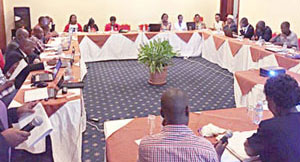 On 27 July participants from central and local government institutions and civil society reviewed the work done in Kasese district on the digitization of certificates of customary ownership and developed plans for the way forward. Participants discussed ways for improvement in terms of participation, capacity development, awareness raising and technology. The workshop was held in Entebbe and was organized by the Ministry of Lands, Housing and Urban Development, the Kasese District Local Government, the Makerere University School of Built Environment and FAO. The pilot in Kasese is part of the support for implementing the Voluntary Guidelines in Uganda. The primary goal is to strengthen land tenure security with a particular focus on women and vulnerable groups by using Open Tenure software and developing a process to issue and maintain certificates of customary ownership. The project is implemented with financial support from the UK Department for International Development. This story was last reported in the March 2015 newsletter.
On 27 July participants from central and local government institutions and civil society reviewed the work done in Kasese district on the digitization of certificates of customary ownership and developed plans for the way forward. Participants discussed ways for improvement in terms of participation, capacity development, awareness raising and technology. The workshop was held in Entebbe and was organized by the Ministry of Lands, Housing and Urban Development, the Kasese District Local Government, the Makerere University School of Built Environment and FAO. The pilot in Kasese is part of the support for implementing the Voluntary Guidelines in Uganda. The primary goal is to strengthen land tenure security with a particular focus on women and vulnerable groups by using Open Tenure software and developing a process to issue and maintain certificates of customary ownership. The project is implemented with financial support from the UK Department for International Development. This story was last reported in the March 2015 newsletter.
2. GETTING TOGETHER: EVENTS ON THE VOLUNTARY GUIDELINES
National workshop on governance of tenure, Central African Republic (1-3 July)
A national workshop on harmonizing legal instruments of tenure took place in Bangui, where 75 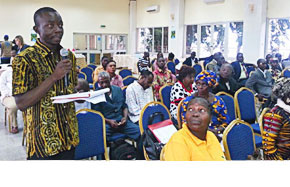 participants discussed the value and use of the Voluntary Guidelines in Central African Republic and identified legal actions to improve governance of tenure. The participants included representatives from academia, civil society, indigenous peoples and the private sector. A comprehensive legal review served as a base to establish principles for future legal reforms and from which to propose a framework law on tenure rights. Wide consultation with local communities and civil society was recommended as a next step towards the adoption of a framework law by government institutions. The workshop closing was chaired by the Prime Minister accompanied by seven ministers. The workshop was organized by the Ministry of Urban Development and Housing with the technical and financial support of FAO.
participants discussed the value and use of the Voluntary Guidelines in Central African Republic and identified legal actions to improve governance of tenure. The participants included representatives from academia, civil society, indigenous peoples and the private sector. A comprehensive legal review served as a base to establish principles for future legal reforms and from which to propose a framework law on tenure rights. Wide consultation with local communities and civil society was recommended as a next step towards the adoption of a framework law by government institutions. The workshop closing was chaired by the Prime Minister accompanied by seven ministers. The workshop was organized by the Ministry of Urban Development and Housing with the technical and financial support of FAO.
UN Country Team roundtable meeting on tenure governance, Uganda (29 July)
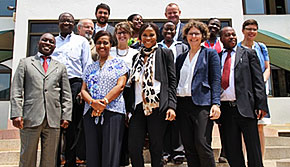 The UN’s Country Team in Uganda used the Voluntary Guidelines as a framework for discussion at a roundtable on tenure governance on 29 July. Country directors and representatives of the key UN agencies operating in Uganda discussed their work, focussing on programme activities that had been implemented and possible ways to increase impact and efficiency by joining forces and improving coordination for the UN to deliver as one to strengthen land tenure security. The meeting was facilitated by FAO under the auspices of the Office of the UN Resident Coordinator.
The UN’s Country Team in Uganda used the Voluntary Guidelines as a framework for discussion at a roundtable on tenure governance on 29 July. Country directors and representatives of the key UN agencies operating in Uganda discussed their work, focussing on programme activities that had been implemented and possible ways to increase impact and efficiency by joining forces and improving coordination for the UN to deliver as one to strengthen land tenure security. The meeting was facilitated by FAO under the auspices of the Office of the UN Resident Coordinator.
16th International Anti-Corruption Conference, Malaysia (2-4 September)
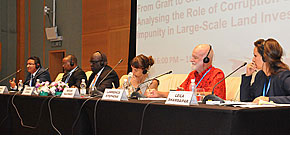 Nearly 1 200 people from 130 countries gathered at the 16th International Anti-Corruption Conference (IACC) in Putrajaya to discuss effective strategies to stop impunity and hold to account those who benefit from the abuse of power, secret deals and bribery. The Voluntary Guidelines were presented at a session, organized by Transparency International and Global Witness, which explored opportunities to improve transparency and accountability in agricultural investments. Transparency, accountability and rule of law are among the 10 implementation principles of the Voluntary Guidelines, which provide a framework for improving governance of tenure and reducing risks of corruption. Corruption in the land sector varies from small-scale bribes and fraud to high-level abuses of power as suggested by the 2011 study by FAO and Transparency International.
Nearly 1 200 people from 130 countries gathered at the 16th International Anti-Corruption Conference (IACC) in Putrajaya to discuss effective strategies to stop impunity and hold to account those who benefit from the abuse of power, secret deals and bribery. The Voluntary Guidelines were presented at a session, organized by Transparency International and Global Witness, which explored opportunities to improve transparency and accountability in agricultural investments. Transparency, accountability and rule of law are among the 10 implementation principles of the Voluntary Guidelines, which provide a framework for improving governance of tenure and reducing risks of corruption. Corruption in the land sector varies from small-scale bribes and fraud to high-level abuses of power as suggested by the 2011 study by FAO and Transparency International.
- Visit the website of the 16th IACC
- Read the Working paper
- Take the e-learning course on Addressing corruption in the tenure of land, fisheries and forests
Regional workshop on land and gender mainstreaming in the Western Balkans, Albania (17-18 September)
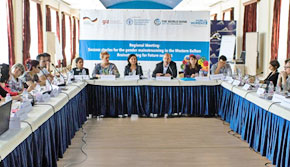 A two-day workshop on Success stories of gender mainstreaming in the Western Balkans – Brainstorming for future support was held in Durres and discussed progress in gender mainstreaming in the Western Balkans together with strategies for gaining additional support. Plans include supporting notaries in collecting data and mainstreaming gender in their daily work; developing regional platforms for collecting, analyzing and disseminating gender-disaggregated data; and supporting the preparation of data for monitoring land-related targets of the Sustainable Development Goals. The workshop brought together information technology and land administration specialists and notaries from Albania, Bosnia and Herzegovina, Kosovo, Montenegro, the former Yugoslav Republic of Macedonia and Serbia. It was supported by FAO, GIZ, The World Bank, and UN Women and followed a FAO-World Bank joint initiative launched in 2013 on the low rate of landownership and property registration by women in the Western Balkans. Watch the video on Gender and land in the Western Balkans Legislation Assessment Tool & Global gender and land statistics: The Gender and Land Rights Database
A two-day workshop on Success stories of gender mainstreaming in the Western Balkans – Brainstorming for future support was held in Durres and discussed progress in gender mainstreaming in the Western Balkans together with strategies for gaining additional support. Plans include supporting notaries in collecting data and mainstreaming gender in their daily work; developing regional platforms for collecting, analyzing and disseminating gender-disaggregated data; and supporting the preparation of data for monitoring land-related targets of the Sustainable Development Goals. The workshop brought together information technology and land administration specialists and notaries from Albania, Bosnia and Herzegovina, Kosovo, Montenegro, the former Yugoslav Republic of Macedonia and Serbia. It was supported by FAO, GIZ, The World Bank, and UN Women and followed a FAO-World Bank joint initiative launched in 2013 on the low rate of landownership and property registration by women in the Western Balkans. Watch the video on Gender and land in the Western Balkans Legislation Assessment Tool & Global gender and land statistics: The Gender and Land Rights Database
3. PARTNERSHIPS WITH THE VOLUNTARY GUIDELINES
The Interlaken Group reports on using the Voluntary Guidelines
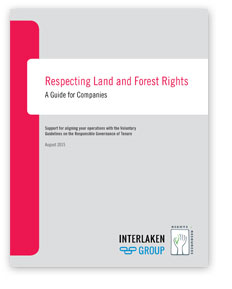 The Interlaken Group, with steering support from the Rights and Resources Initiative, has developed a new guide - Respecting Land and Forest Rights - to support companies aiming to align their operations with the Voluntary Guidelines. The guide is intended to support companies, both leadership and operational staff in the field, aiming to observe and implement the Voluntary Guidelines and help them do their part to respect local land and forest tenure rights. It reflects the Interlaken Group’s understanding of a company’s responsibilities under the Voluntary Guidelines. The tool is applicable across land-based sectors, with special emphasis given to agribusiness and forestry operations to reflect the particular expertise of Interlaken Group members. The Interlaken Group is a multi-stakeholder forum composed of representatives from companies, investors, international organizations and civil society groups, including Nestlé, Stora Enso, Rio Tinto, Coca-Cola, Unilever, IFC, Rabobank, TMP Systems, Oxfam, Global Witness, RRI, ERM, The Forest Trust, Landesa, Forest Peoples Programme, Olam, Omidyar Network, and DFID. The Group is dedicated to implementing and promoting the Voluntary Guidelines and has met regularly since 2013 to identify practical ways that companies and their investors can support improved land governance and the land rights of rural populations.
The Interlaken Group, with steering support from the Rights and Resources Initiative, has developed a new guide - Respecting Land and Forest Rights - to support companies aiming to align their operations with the Voluntary Guidelines. The guide is intended to support companies, both leadership and operational staff in the field, aiming to observe and implement the Voluntary Guidelines and help them do their part to respect local land and forest tenure rights. It reflects the Interlaken Group’s understanding of a company’s responsibilities under the Voluntary Guidelines. The tool is applicable across land-based sectors, with special emphasis given to agribusiness and forestry operations to reflect the particular expertise of Interlaken Group members. The Interlaken Group is a multi-stakeholder forum composed of representatives from companies, investors, international organizations and civil society groups, including Nestlé, Stora Enso, Rio Tinto, Coca-Cola, Unilever, IFC, Rabobank, TMP Systems, Oxfam, Global Witness, RRI, ERM, The Forest Trust, Landesa, Forest Peoples Programme, Olam, Omidyar Network, and DFID. The Group is dedicated to implementing and promoting the Voluntary Guidelines and has met regularly since 2013 to identify practical ways that companies and their investors can support improved land governance and the land rights of rural populations.
FIAN International reports on a monitoring tool based on the Voluntary Guidelines
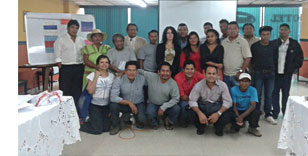 In July, FIAN International launched a Monitoring Tool Based on the Voluntary Guidelines on the Responsible Governance of Tenure of Land, Fisheries and Forests (in Spanish). This tool aims to support social organizations in their efforts to monitor independently whether or not States fulfill their obligations under international human rights law in relation to tenure of land, fisheries and forests. FIAN International hopes that this publication will contribute to strengthening civil society movements, and reinforce and broaden the scope of national and international legal frameworks that recognize, respect, protect and guarantee the rights to land and other natural resources of marginalized social groups. The tool was launched in Panama during 24-25 July at the Second Regional Meeting on the Peoples' Monitoring of the Implementation of the Guidelines on Tenure of Land, Fisheries and Forests, organized by the Latin American Alliance for Food Sovereignty. Participants included representatives from Latin American civil society and regional governments.
In July, FIAN International launched a Monitoring Tool Based on the Voluntary Guidelines on the Responsible Governance of Tenure of Land, Fisheries and Forests (in Spanish). This tool aims to support social organizations in their efforts to monitor independently whether or not States fulfill their obligations under international human rights law in relation to tenure of land, fisheries and forests. FIAN International hopes that this publication will contribute to strengthening civil society movements, and reinforce and broaden the scope of national and international legal frameworks that recognize, respect, protect and guarantee the rights to land and other natural resources of marginalized social groups. The tool was launched in Panama during 24-25 July at the Second Regional Meeting on the Peoples' Monitoring of the Implementation of the Guidelines on Tenure of Land, Fisheries and Forests, organized by the Latin American Alliance for Food Sovereignty. Participants included representatives from Latin American civil society and regional governments.
4. SUPPORT FOR THE VOLUNTARY GUIDELINES
New Alliance and Grow Africa Leadership Council reaffirm support for the Voluntary Guidelines
The New Alliance and Grow Africa Leadership Council reaffirmed their support for the implementation of the Voluntary Guidelines at their annual meeting held in June in Cape Town. The informal dialogue assessed progress and advance action on key priorities to enable responsible, sustainable and inclusive investment in African agriculture. Meeting participants included African regional institutions and governments, G7 governments, international organizations, African and global private sector companies, farmers’ associations, and civil society. CAADP Development Partners and FAO developed an Analytical Framework for Investors as a tool for implementation of the Voluntary Guidelines, in alignment with the African Union’s Framework and Guidelines, and the FAO Technical Guide for Investors (forthcoming). The Analytical Framework was developed through consultation with a broad array of stakeholders. Read the Joint Statement of the African Union Commission and the World Economic Forum, Co-Conveners of the Leadership Council.
